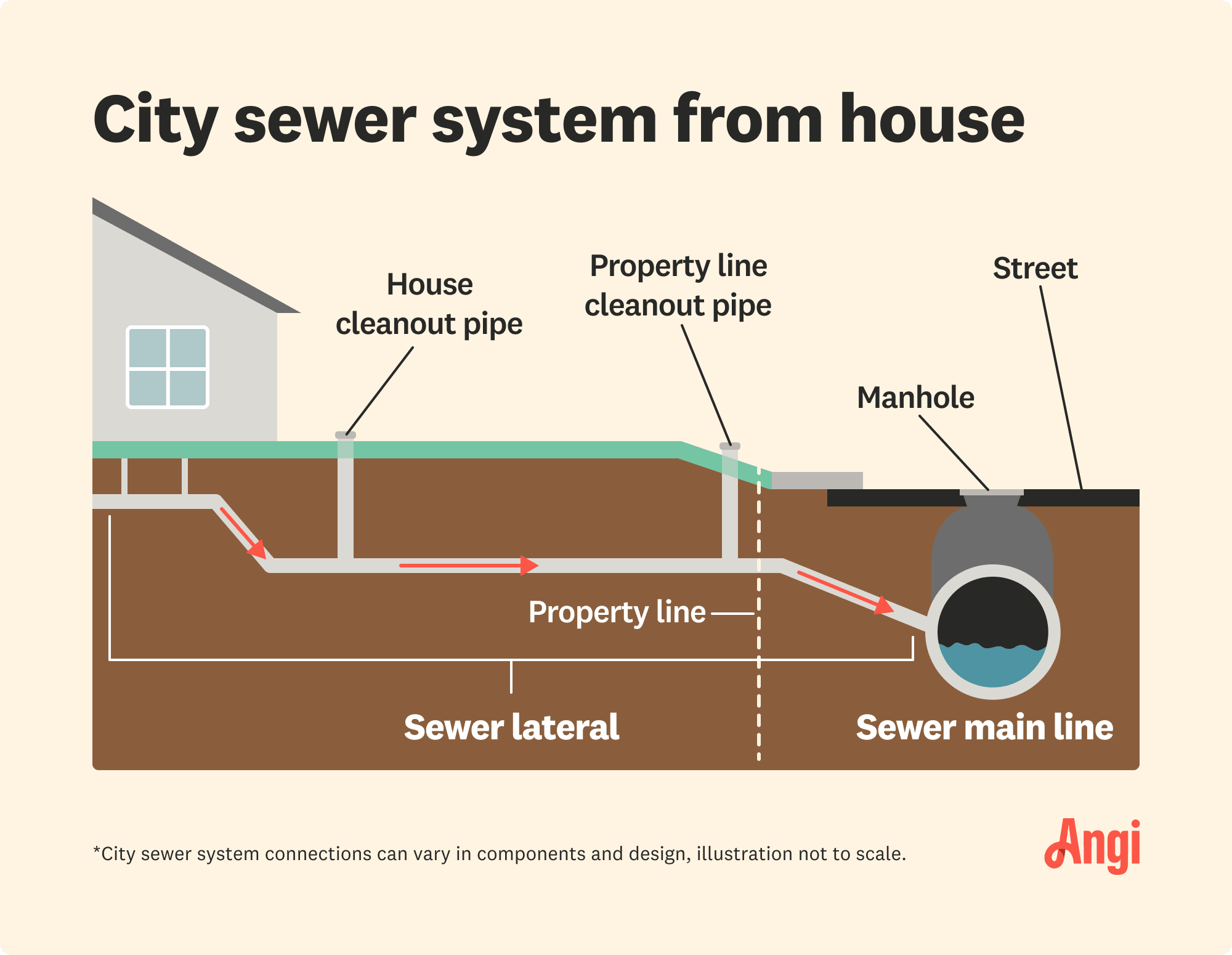
You should do a septic inspection once every one to three years to ensure you don’t have any issues. Learn about septic inspection costs before scheduling.
Most people pay $2,269 to install a sewer line in Atlanta, Georgia, but depending on materials and labor costs in your area, you may end up paying between $1,042 and $3,643.


Atlanta’s trademark clay soil creates unique challenges that can drive costs up by 15% to 25% compared to other areas.
Summer thunderstorms and freezing winter temperatures mean you’ll need more durable, higher-end pipe materials.
Tree-lined neighborhoods with mature oaks and magnolias often need extensive—and expensive—root or tree removal.
Trenchless installation methods in Atlanta avoid disrupting the ground’s surface, which can save money.
Replacing a sewer line in Atlanta, Georgia, is a significant expense, which can quickly grow due to clay soil, challenging weather, and mature trees. The cost to install a sewer line in Atlanta averages $2,269, but it can range from $1,042 to $3,643 depending on factors like labor, materials, permitting, and repairing damage after all that digging. Get a feel for the major cost factors so you have a game plan for your budget.
There’s a complicating factor to the cost of installing a sewer line in Atlanta, Georgia—the features that make the city beautiful also make sewer line services tricky. Mature trees have roots that can entangle pipes, the rich soil turns hard during the dry months and mucky when wet, and the bustling neighborhoods are compact and covered with paving and landscaping that make the job more costly. Let’s break down how these Atlanta quirks translate into real costs.

Depending on the type of sewer pipe you choose, the average cost to install a sewer line in Atlanta ranges from $50 to $300 per linear foot. Sewer line pipes are about 5 inches in diameter and run underneath your yard from your house to the main sewer drain.
| Length (Feet) | Average Cost |
|---|---|
| 25 | $1,250–$6,250 |
| 50 | $2,500–$12,500 |
| 75 | $3,750–$18,750 |
| 100 | $5,000–$25,000 |
To install a sewer line, you’ll need to purchase the pipes that connect the main sewer drain to your home. New pipes cost about $3 to $25 per linear foot. Factor in the type of piping material to get a closer estimate.
| Piping Material | Pros | Cons | Average Cost (Per Linear Foot) |
|---|---|---|---|
| PVC | Lightweight, budget-friendly, resists corrosion | Can become brittle during Atlanta's occasional hard freezes | $3–$12 |
| ABS | Stronger than PVC, handles temperature fluctuations well | More expensive, not to code in some areas | $5–15 |
| Cast iron | Durable, best for clay soil that moves | Heavy, expensive, prone to rust | $12–$25 |
| HDPE | Flexible, excellent for trenchless installation, resists tree root intrusion | Requires special installation equipment, higher cost | $8–$20 |
Be prepared for all of the steps that come with site prep for a sewer line installation in Atlanta.
Between the clay soil and trees that claim a lot of underground territory, preparation costs can rise as your contractor digs down deep.
Trenching cost in clay soil: Georgia’s red clay looks pretty, but digging through it can get costly. Trenching will take longer than it would in easier soil, adding a cost of $1,200–$1,800 per 100 linear feet. Costs can go higher if it rains and the soil gets stickier.
Rock and hardpan removal: When the Atlanta clay compacts, your pro will need special equipment to break through, and large boulder removal increases costs. Budget $100–$300 per cubic yard of rock and hardpan.
Tree removal cost: Atlanta’s famous oaks, pines, and magnolias have root systems that spread and love water—so they love sewer lines. Removal costs $500–$2,500 per tree, depending on the size and location.
Root removal and grinding: After a tree is gone, roots stick around underground. They've got to go before your new pipes go in. Depending on the size of the job, this can cost $200–$800.
Pavement removal cost: Breaking up driveways, patios, or sidewalks that cross over the path of sewer lines costs about $8–$15 per square foot. A concrete contractor will have to estimate the cost to replace them.
Utility line relocation: In older neighborhoods where gas, electric, and cable lines interfere with your planned sewer route, moving them adds $500–$2,000 per line.
Working with the right pros is essential, and it’s doubly so when you’re replacing a sewer line or installing a new one in Atlanta, where the soil and conditions are challenging and the city has strict regulations.
Atlanta’s Zoning, Development, and Permitting office handles permits for sewer work. You're looking at $300 to $800 in permit fees, depending on how complex your project gets and where you live in the metro area. You’ll likely need permits for plumbing, excavation, connecting to city water mains, and watershed protection. Count on inspections before, during, and after the work, and expect each inspection to cost between $75 and $125.
If you live in a neighborhood with a homeowners association (HOA), you’ll need to obtain permission to dig. Your HOA may require you to submit plans, go before a review board, and pay fees.
Your sewer line repair pro in Atlanta, Georgia, can help you understand the permits, regulations, and associated fees that apply to your sewer line replacement costs. Ask them about fees during the initial bidding phase, and find out if they include the charges as part of your overall job total.
Because it’s a booming town with unique challenges, the labor cost to install sewer lines in Atlanta, Georgia, can be higher than in other areas. In most cases, professional labor costs between $45 and $85 per hour, and most projects require a crew of two to four workers over several days. That can add up fast, and it goes higher if conditions are more challenging than usual or your job is difficult to access. Some contractors also charge a fee for handling permitting and paperwork, which can add $500 to $1,200 to the overall job.
Trenchless sewer line installers charge $75 to $125 per hour or more. However, trenchless sewer repair means your pro can insert a new pipe without making your landscape a mess, and you can potentially save money on the back half of the project.
Seasonal pricing can also affect your project. Summer jobs can include extra costs if your contractor ends up digging longer because of muddy soil, but winter work can require special equipment if your scheduled job takes place during an unexpected freeze. Likewise, some contractors charge more during peak season. Talk with your sewer line installer about how seasonality impacts their pricing.
They call it Hotlanta for more than one reason—the real estate market is as hot as the summers. But while a new sewer line won’t make buyers swoon like a renovated kitchen or swimming pool, it can still make your home attractive to buyers.
Protection against cracked sewer pipes: New sewer lines are better able to withstand Atlanta's constant shift of clay soils without cracking, preventing sewage leaks and backups.
Rust-proof peace of mind: Modern pipes resist aggressive tree roots, wet conditions, and corrosive soils, meaning there’s less worry over emergency repairs.
Storm readiness: Proper pipe materials and installations can handle summer deluges better than old pipes, which helps keep basements dry when the skies open up.
Insurance upsides: Some insurance companies in Georgia offer discounts for homes with recently upgraded sewer lines because they’re less likely to fail.
Home is the most important place on earth, which is why Angi has helped more than 150 million homeowners transform their houses into homes they adore. To help homeowners with their next project, Angi provides readers with the most accurate cost data and upholds strict editorial standards. We survey real Angi customers about their project costs to develop the pricing data you see, so you can make the best decisions for you and your home. We pair this data with research from reputable sources, including the U.S. Bureau of Labor Statistics, academic journals, market studies, and interviews with industry experts—all to ensure our prices reflect real-world projects.
Want to help us improve our cost data? Send us a recent project quote to [email protected]. Quotes and personal information will not be shared publicly.
From average costs to expert advice, get all the answers you need to get your job done.

You should do a septic inspection once every one to three years to ensure you don’t have any issues. Learn about septic inspection costs before scheduling.

Need to know what sewer line replacement costs in Columbus, OH? This guide will help you prepare to budget for sewer line replacement done by local contractors.

The cost of converting a cesspool to a septic system depends on factors like labor, complexity, and materials. Use our guide to estimate your budget.

If you’re unsure how to fill in a cesspool, we’re here to teach you the ropes, explain the tools, and help you hire a pro if needed.

Wondering if an anaerobic septic system is the right choice for your home? Check out this guide to learn more about how this type of system works.

What is a septic tank distribution box, and how important is it? Learn about this critical component, its purpose, and how it functions in this guide.